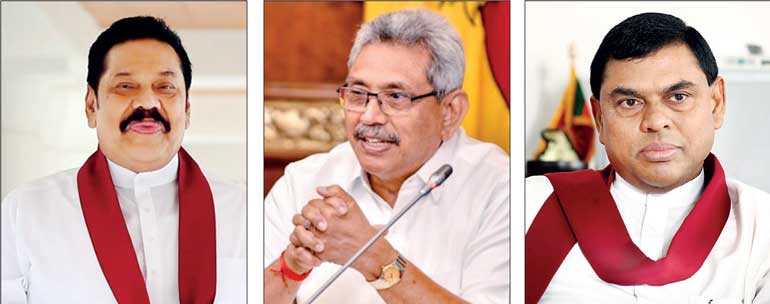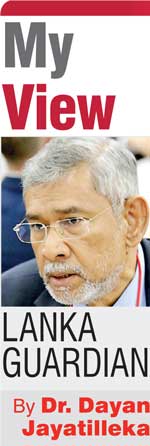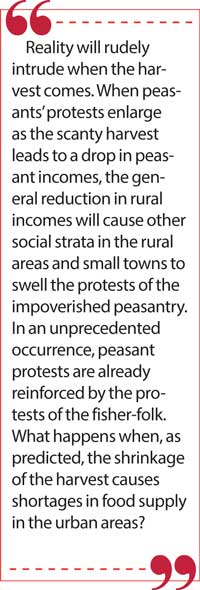Thursday Feb 19, 2026
Thursday Feb 19, 2026
Thursday, 8 July 2021 00:05 - - {{hitsCtrl.values.hits}}

The crisis is bigger than Basil. So is the GR model. BR could have re-balanced and re-set things for the better but he went way overboard with the two-thirds majority and the 20th Amendment instead of a broadly consensual revised 19th or 20A minus, which would have strengthened MR’s and his own power-base. MR’s original idea was that GR’s candidacy would be the best shot at winning the election while Basil would help balance-off GR. Instead, BR tilted to GR, downsizing MR. This might have been less disastrous had GR not had a whole new regime model in mind
 In the midst of an acute crisis of hard currency and a loan from Bangladesh, Sri Lanka’s Defence Ministry has just signed a $ 50 million deal with Israeli Aerospace Industries to upgrade its fleet of Kfirs to 4.5 generation fighter capacity.
In the midst of an acute crisis of hard currency and a loan from Bangladesh, Sri Lanka’s Defence Ministry has just signed a $ 50 million deal with Israeli Aerospace Industries to upgrade its fleet of Kfirs to 4.5 generation fighter capacity.
Why make this huge dent in our dwindling stock of dollars when children are studying on treetops and peasants are protesting about imminent crop failure? Who are we going to deter or dogfight with? India, with its squadrons of Dassault Rafales, MiG 29s and Sukhoi 30s and pilots who play wargames with the US Air Force and occasionally win?
China is the role model of the Gotabaya regime only in the security realm, not the socioeconomic. The Chinese leaders do everything possible to keep the Chinese people, including its middle class, prosperous, comfortable and happy. It is the most affluent, upwardly mobile and consumerist middle class in the world.
As for the rural areas, there is nothing more the Chinese leaders are averse to than unrest among the peasantry, and the CPC seeks to pre-empt it not by suppression but by prosperity. That is why China, with a lower GDP than the USA, leads the USA in Purchasing Power Parity. The socioeconomic policies of the Gotabaya Presidency resulting in immiseration (‘immiserisation’), completely contradict the China policy model.
Harsh harvest
Two days after the President’s meeting with representatives of peasant associations, one of the attendees seen on TV at the meeting went on TV himself. He claimed that of the three categories of peasant associations in the country, the one which had been invited for the meeting was the smallest, in that it accounted for the smallest percentage of arable land under cultivation. He also asserted that before the meeting they had been prepped by Minister Aluthgamage.
The ideological campaign in favour of the rapid conversion of the entire country to organic agriculture is being spearheaded by the Viyath Maga and endorsed by Jathika Chinthanaya co-founder Dr. Gunadasa Amarasekara. Meanwhile the daily torrent of criticism and alarm from scientists, academics and agriculturalists, including those with decades of service in the public and private sectors, continues, as does peasant discontent. When the criticisms and protests encompass old women in the fields, small producers of tea, professors in Sri Lanka and Australia, and former planters of the Ceylonese elite, any rational and realistic regime would sit up, take notice, and self-correct.
Reality will rudely intrude when the harvest comes. When peasants’ protests enlarge as the scanty harvest leads to a drop in peasant incomes, the general reduction in rural incomes will cause other social strata in the rural areas and small towns to swell the protests of the impoverished peasantry.
In an unprecedented occurrence, peasant protests are already reinforced by the protests of the fisher-folk.
What happens when, as predicted, the shrinkage of the harvest causes shortages in food supply in the urban areas? If the solution is to import every type of food that is in short supply it would logically exacerbate the foreign exchange crisis.
The most recent to protest are the various branches of the health and health-related sectors. Before long, food shortages may drive urban fixed wage earners and the poor and marginalised urban dwellers to the streets. What happens if the retail shop-owners and their employees join the protest because shortages have ruined their sales revenues?
The Police have arrested the two most vocal advocates of the rights of the peasantry, the JVP’s Samantha Widyaratne and Namal Karunaratne, and the FSP’s presidential candidate Duminda Nagamuwa. Protests have been banned under COVID rules. The peasant protest may have been belatedly backed by JVPers but they certainly didn’t create it. The seeds of the peasant unrest were sown needlessly and heedlessly by the Government’s ‘shock-and-awe’ agrarian policy. The peasant protests were self-started, and the JVP drawn in because of pressure from below.
The Deep State may assume that cracking down on the JVP will provoke it into violent militancy which can serve as a security threat to impose military rule, skewing or pre-empting elections as well as dissent from within the Government.
The JVP is not readying to rebel. If there is a rebellion, the prospective rebels are hitherto unknown people who will be radicalised by the Government’s policies and behaviour, and are probably not even members of the JVP but will join it for want of organisation and then push impatiently from below for more militant resistance as the State begins its repression.
The power-elite must remember that none of the rebellions, south and north, which erupted on this island and were defeated by the military, ever took place against the backdrop of severe economic crisis or emerged from the womb of the working masses including the peasantry. They arose from the educated or semi-educated unemployed youth. A social resistance anchored in the working people turning rebellious in the context of an economic downward spiral, is a qualitatively different phenomenon.
During the centenary of the founding of the Communist Party of China, which should be regarded as historically far more positive than negative—whatever the errors of the CPC, including aspects of the current line, especially the international line, of the current leadership—it is apposite to recall Mao’s famous slogan: ‘A Single Spark Can Start a Prairie Fire!’ By suppressing the peasantry, the media, the JVP and FSP, the regime may supply the spark.
Bigger than Basil
The crisis is bigger than Basil. So is the GR model. BR could have re-balanced and re-set things for the better but he went way overboard with the two-thirds majority and the 20th Amendment instead of a broadly consensual revised 19th or 20A minus, which would have strengthened MR’s and his own power-base.
MR’s original idea was that GR’s candidacy would be the best shot at winning the election while Basil would help balance-off GR. Instead, BR tilted to GR, downsizing MR. This might have been less disastrous had GR not had a whole new regime model in mind.
The playing field that has now been constructed is not the one that BR played in before, and which MR excelled in. It is no longer the system in which MR, Chamal, BR, and Namal came up, and DM and DA Rajapaksa and Lakshman and George Rajapaksa laid the foundations for today’s Rajapaksa Raj. That was a normal, purely civilian, democratic system. 
What GR has built is an abnormal system; an ‘exceptional regime’ with structural elements of an ‘exceptional state’ – and I don’t mean an exceptionally good one. The crisis is not only in software coding; it originates in a basic design flaw in the hard-drive. Basil can do no more than apply “lipstick on a pig” (as Barack Obama famously said of his opponent).
The burgeoning BR cult, alongside the more established Rajapaksa cults, proves beyond reasonable doubt that the regime is classifiable as a clan-centred oligarchy with a hyper-presidential autocracy as apex.
How many personality cults can one clan have at one time, without internal collision? In its revisionist history and cult of personality, the latest BR publicity campaign takes something away from the MR and GR narratives. It introduces multipolarity into the Government while the post-20A State system itself is unipolar, and may generate fissures along different circuits of loyalty.
Thanks to my father, I witnessed at close range a Bandaranaike administration loaded with an extended family: Sirimavo, Felix, Sunethra, Chandrika, Anura, Mackie, Seewali, Barnes, Ira, etc. Their presence imparted to the Government a profile that was an easy target. It also proliferated internal contradictions. The weight of the family sank the ship.
Mangala’s myths
Former Foreign Minister and Finance Minister Mangala Samaraweera recently wrote a full-on critique of Sri Lanka’s external relations in which he attacks China’s BRI without noting a single positive feature about it—a position that Jacinda Ardern, for one, never takes.
Sri Lanka must equally eschew Rajapaksa’s Sinophilia and Samaraweera’s Sinophobia. Mangala’s policy-prescriptive article makes no reference to Non-Alignment/the NAM, multipolarity or Lakshman Kadirgamar.
He poses as the vanguard of resistance to Chinese ‘expansionism’. The truth is that the expansion of China’s influence, as well as the military/Presidential Task Force driven creation of ‘facts on the ground’ in strategically crucial north-eastern Sri Lanka (neighbouring India), cannot be countervailed or buffered against because the buffer of the Northern and Eastern Provincial Councils, product of the Indo-Sri Lanka Accord and the 13th Amendment, has been deactivated by the Ranil-Mangala UNP’s mangling in alliance with the TNA and JVP, of the system of elections to Provincial Councils, and their foredoomed project of leaping beyond the 13th Amendment instead of implementing it.
Mangala contributed to the margin of the victory of China’s main ally in the Indian Ocean, President Gotabaya. His bombshell in the midst of Sajith’s 2019 presidential campaign that a UNP Government would go ahead with the contentious MCC, swung a percentage of votes to GR and away from Premadasa, who on the UNP’s downswing, missed the 50% mark by only 8%.
Mangala posits an ignorant interpretation of the most written-about international crisis of the post-war 20th century, the Cuban Missile Crisis, attributing the stationing of Soviet missiles in Cuba to “financial compulsions”.
“…In the great power play between superpowers, Sri Lanka cannot afford to be a pawn of one group or another like Cuba in the early 1960s when not ideological but financial considerations compelled the Cuban government to allow USSR to install nuclear missiles 65km from the USA nearly triggering off a nuclear war in the Bay of Pigs.” (Sri Lanka’s century of humiliation | Daily FT – https://www.ft.lk/opinion/Sri-Lanka-s-century-of-humiliation/14-719879)
No American or Western leader or scholar, however hostile or critical, ever characterised Cuba as “a pawn” of any group or power. In the academic literature Cuba was nicknamed a “pocket superpower” because it autonomously punched way above its weight in world affairs. Mangala, who tried to turn Sri Lanka into “a pawn” of the West, wouldn’t get it. 
There have been several international meetings on the major anniversaries of the Missile Crisis, bringing together the key Cuban, Soviet and American players. The conference sponsored by George Washington University and Brown University to mark the 40th anniversary of the Missile Crisis had Arthur Schlesinger, Theodore Sorenson and Robert McNamara as participants and Fidel Castro chairing. Never has any participant in or historian of the Missile Crisis even remotely suggested that “financial compulsions” had anything whatsoever to do with Cuba’s decision to accept the missiles or indeed with the Missile Crisis itself.
It is amply documented that the decision to station Soviet missiles in Cuba was against the backdrop of a US plan for the invasion of the island, and that the decision to station the missiles was entirely a Soviet one, which Castro agreed to with some misgivings. Both the misgivings and the acceptance contained a moral dimension, not a financial one.
Fidel went on record explaining Cuba’s motivations:
“We did not like the missiles. If it were a matter of our defence alone, we would not have accepted the missiles here. But do not think it was because of the dangers that would come from having the missiles here, but rather because of the way in which this could damage the image of the revolution in Latin America…I thought: if we expected the Soviets to fight for our cause, to take risks for us, and if they were even prepared to go to war for our sake, it would have been immoral and cowardly not to allow the presence of the missiles here.” (Fidel Castro, CNN TV interview Sept 13 1998, Chang/Kornblugh, ‘The Cuban Missile Crisis’ p 346, in Skierka, Fidel Castro: A Biography)
Never in its history has post-revolutionary Cuba been “compelled” to take any strategic military or foreign policy stand or initiative for “financial considerations”. That’s not something that Mangala would comprehend: Hambantota has a larger, longer-lasting Chinese footprint than under MR because Ranil and Mangala kowtowed before “financial compulsions”.
Quite unlike Samaraweera, Foreign Minister Lakshman Kadirgamar was knowledgeable about Cold War history and respected Cuba. The evening before he was assassinated, he launched the new refereed BCIS journal he had conceived of, published by SAGE. It featured an essay by me entitled ‘The Moral Sierra Maestra: The Moral-Ethical Dimension of the Political Thought and Strategy of Fidel Castro’ (International Relations in a Globalizing World, 1(2):161-202).
Premadasa principle
Chandani Kirinde’s review of former UK High Commissioner to Sri Lanka David Gladstone’s memoir ‘A Sri Lankan Tempest,’ a work which is acerbic about President Premadasa, implicitly clarifies the parameters of Premadasa’s middle path on sovereignty and foreign relations.
‘President Premadasa was keen to ensure that the poll [May 1991] was conducted in a free and fair manner and thought it best to invite international monitors to observe and report on it. The Government’s intention was conveyed to the Ambassadorial Group and as it so happened the British High Commissioner was assigned with the task of monitoring the poll in the Southern Province.’ (Daily FT)
Premadasa’s was not the absolutist sovereignty doctrine of President Gotabaya. It aspired to international standards and invited foreign scrutiny. Unlike Ranil-Mangala foreign policy, it also ruled out patronising, interventionist participation.
As the memoir recounts, when Gladstone transgressed the limits of an observer/monitor, entered a Police station and signed a document, the UK Government was requested to remove him from Colombo. When it didn’t, Premadasa declared him persona non grata—undeterred by his son Sajith’s presence as a final year student at the LSE. (At the time Mangala was a federalist and close friend of Gladstone, while a bitter foe of Premadasa).
Jefferson’s two parties
Here's a master-key to understanding politics in Sri Lanka and the world. This is the definition of one of the most outstanding leaders—and democrats—the world has known, Thomas Jefferson:
“Men by their constitutions are naturally divided into two parties: 1. Those who fear and distrust the people, and wish to draw all powers from them into the hands of the higher classes. 2. Those who identify themselves with the people, have confidence in them, cherish and consider them as the most honest and safe, although not the most wise depository of the public interests.” (Jefferson, letter to Henry Lee, 10 August 1824, ‘The Life,’ p 714.)
John Ralston Saul follows this up: “For these words higher classes we must substitute managerial classes or technocratic…In other words our modern elites fall into Jefferson’s first category. They fear and distrust the people.” (‘Voltaire’s Bastards,’ p 137)
Those who fear even a democratic (USA, France) presidency, “fear and distrust” republicanism and national political leadership rooted in the electoral choice of the whole people. They prefer the non-republican Westminster half-measure.
Jefferson’s categorisation also explains the sour silence of Sri Lankan policy wonks, Government and Opposition, about neo-FDR ‘Bidenomics’.
My political choices and engagements—K. Pathmanabha (EPRLF founder), Vijaya Kumaratunga, Ranasinghe Premadasa, Mahinda Rajapaksa and now Sajith Premadasa—belong(ed) to Jefferson’s second ‘party’. Hostility to those political options came from Jefferson’s first ‘party’.